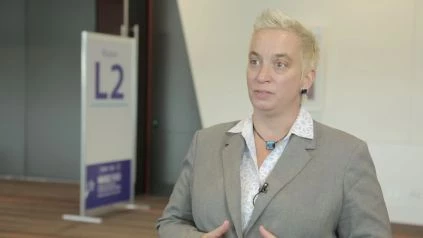Karen Mustian, PhD, MPH, ACSM of the University of Rochester Medical Center, Rochester, New York, NY, discusses the importance of exercise in treating cancer-related fatigue. Dr Mustian presented a talk where she summarized the data from 113 randomized clinical trials that were conducted by investigators from around the world. Aerobic (i.e. walking, cycling and swimming) and anaerobic exercises (such as resistance bands and weight training), either on its own, or in combination, help with a patients fatigue. The data suggests that exercise interventions actually produce larger improvements in fatigue and a more significant improvement than what pharmaceuticals have to offer. Dr Mustian mentions two guidelines: American College of Sports Medicine (ACSM) and Australian exercise guidelines for cancer patients and survivors. These recommend that patients should receive about 150 minutes of moderate-intensity aerobic activity or 2/3 days of weight training at a moderate-intensity using major muscle groups. The 10,000 steps rule is not an exercise prescription, but a guideline. The guidelines are a global goal that can influence public health at large. A prescription is given to an individual, i.e. when a cancer patient presents with a severe fatigue, clinicians are able to offer an individualized prescription that is specifically tailored to the patients current fitness and activity level. It also takes into account what type of fatigue they experience: mental fatigue, physical fatigue, or overall fatigue. Dr Mustian explains that the data shows that medication adherence is often frequently low (around 50%). Although it may be easy to take a pill, patients do not necessarily prescribe to pharmaceutical prescriptions any better than they do to behavioral prescriptions. The key is to balance the prescription, and in turn target the specific outcome that is required. Clinicians promote many modes of activity whether it be walking, yoga, or swimming, all dependent on what the patient enjoys, and what is convenient to them. It is important to discuss exercise with the patient, knowing what toxicity and side effects they may experience whilst treating the disease. One thing clinicians can do for their patients is to become aware of the knowledgeable exercise specialists in their community to make referrals just as in case of any other medical specialty need for their patients. Recorded at the Multinational Association of Supportive Care in Cancer (MASCC) and International Society of Ocular Oncology (ISOO) 2016 Annual Meeting on Supportive Care in Cancer held in Adelaide, Australia.
The importance of exercise in treating cancer-related fatigue

